Contract Law in South African Law: Analysis of Various Legal Aspects
VerifiedAdded on 2023/06/12
|6
|1779
|201
AI Summary
This article discusses various legal aspects of contract law in South African law, including negative option marketing, Pacta de contrahendo, and duress. It also provides advice on legal enforceability of contracts entered under duress and delictual damages.
Contribute Materials
Your contribution can guide someone’s learning journey. Share your
documents today.
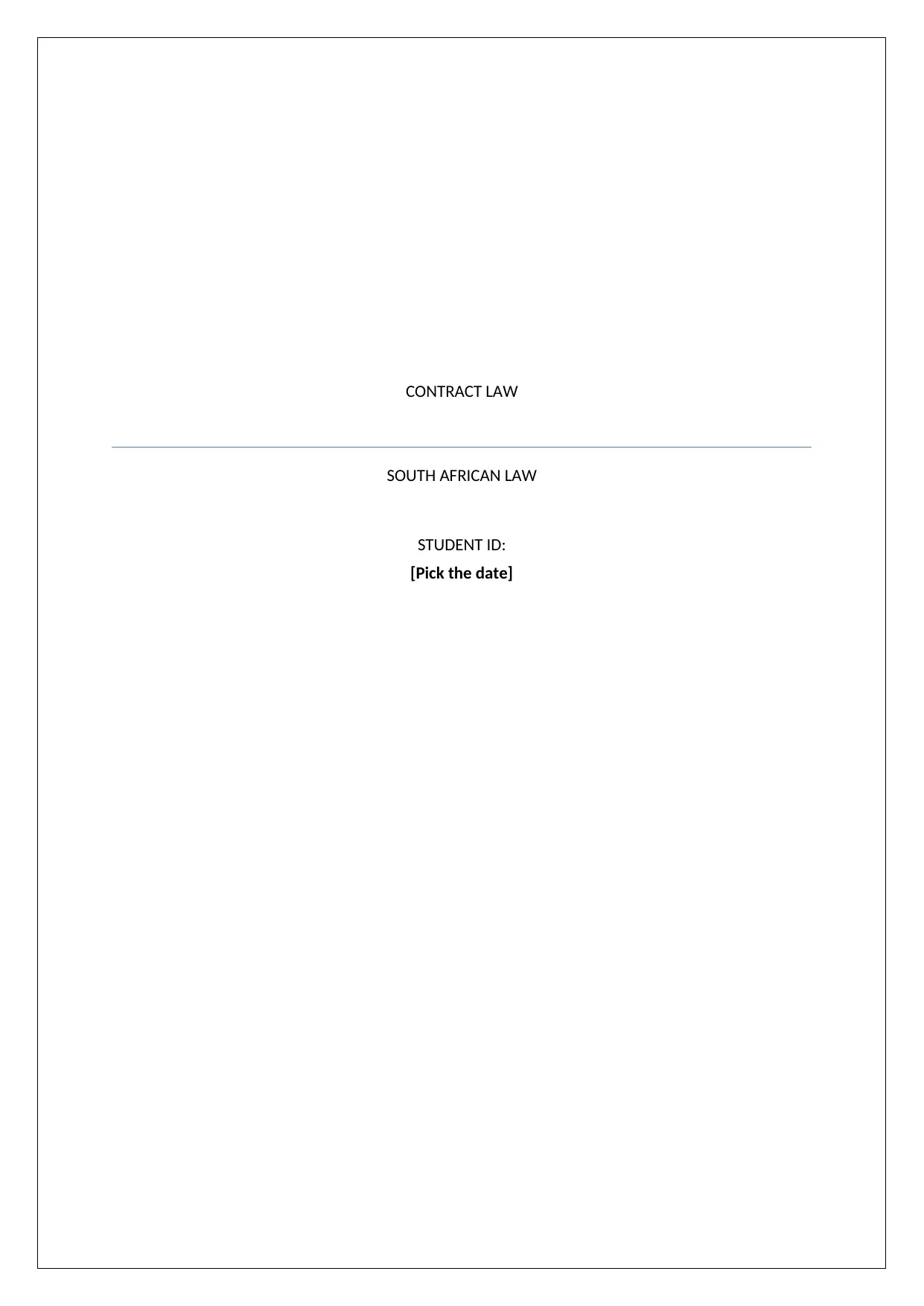
CONTRACT LAW
SOUTH AFRICAN LAW
STUDENT ID:
[Pick the date]
SOUTH AFRICAN LAW
STUDENT ID:
[Pick the date]
Secure Best Marks with AI Grader
Need help grading? Try our AI Grader for instant feedback on your assignments.
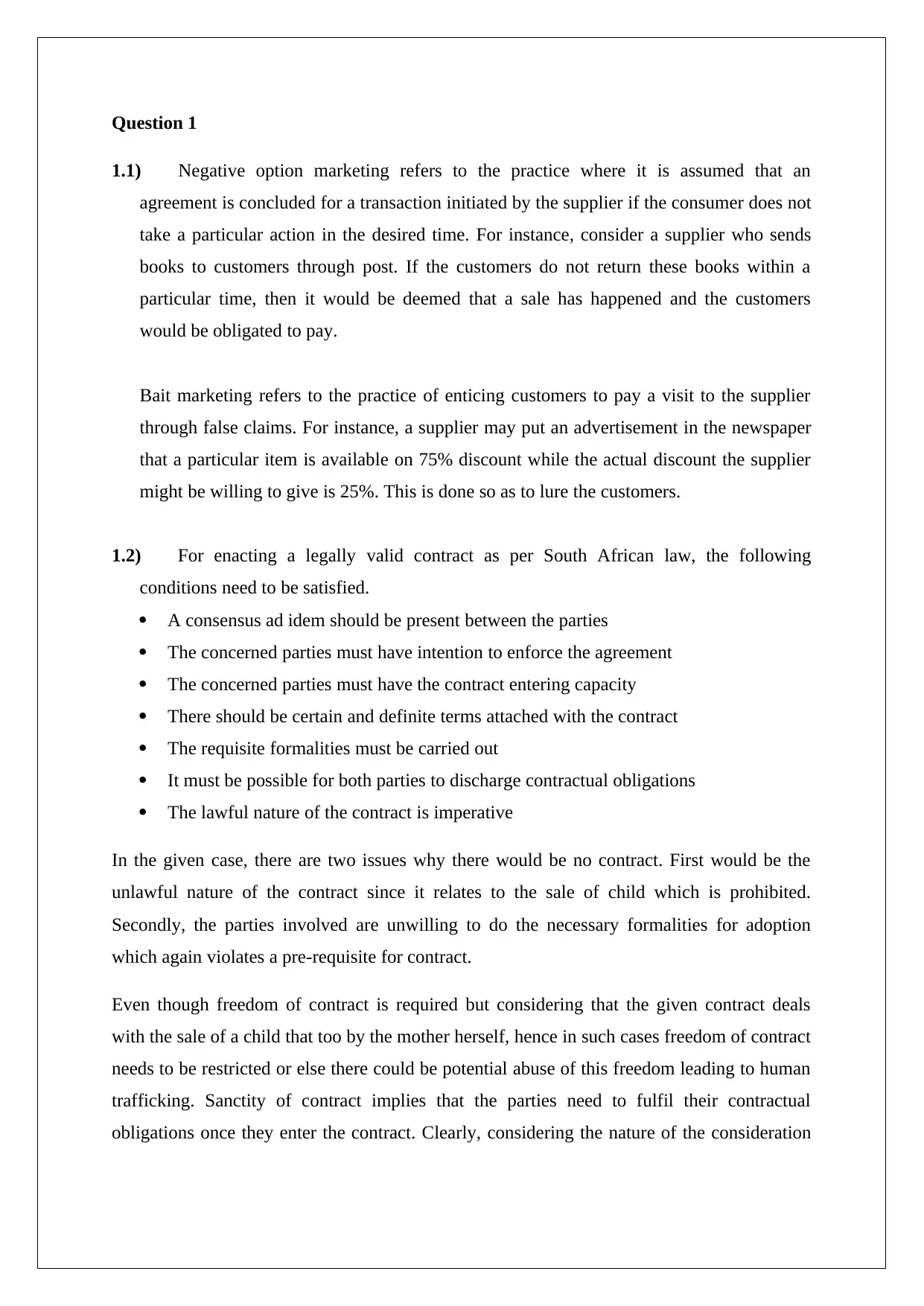
Question 1
1.1) Negative option marketing refers to the practice where it is assumed that an
agreement is concluded for a transaction initiated by the supplier if the consumer does not
take a particular action in the desired time. For instance, consider a supplier who sends
books to customers through post. If the customers do not return these books within a
particular time, then it would be deemed that a sale has happened and the customers
would be obligated to pay.
Bait marketing refers to the practice of enticing customers to pay a visit to the supplier
through false claims. For instance, a supplier may put an advertisement in the newspaper
that a particular item is available on 75% discount while the actual discount the supplier
might be willing to give is 25%. This is done so as to lure the customers.
1.2) For enacting a legally valid contract as per South African law, the following
conditions need to be satisfied.
A consensus ad idem should be present between the parties
The concerned parties must have intention to enforce the agreement
The concerned parties must have the contract entering capacity
There should be certain and definite terms attached with the contract
The requisite formalities must be carried out
It must be possible for both parties to discharge contractual obligations
The lawful nature of the contract is imperative
In the given case, there are two issues why there would be no contract. First would be the
unlawful nature of the contract since it relates to the sale of child which is prohibited.
Secondly, the parties involved are unwilling to do the necessary formalities for adoption
which again violates a pre-requisite for contract.
Even though freedom of contract is required but considering that the given contract deals
with the sale of a child that too by the mother herself, hence in such cases freedom of contract
needs to be restricted or else there could be potential abuse of this freedom leading to human
trafficking. Sanctity of contract implies that the parties need to fulfil their contractual
obligations once they enter the contract. Clearly, considering the nature of the consideration
1.1) Negative option marketing refers to the practice where it is assumed that an
agreement is concluded for a transaction initiated by the supplier if the consumer does not
take a particular action in the desired time. For instance, consider a supplier who sends
books to customers through post. If the customers do not return these books within a
particular time, then it would be deemed that a sale has happened and the customers
would be obligated to pay.
Bait marketing refers to the practice of enticing customers to pay a visit to the supplier
through false claims. For instance, a supplier may put an advertisement in the newspaper
that a particular item is available on 75% discount while the actual discount the supplier
might be willing to give is 25%. This is done so as to lure the customers.
1.2) For enacting a legally valid contract as per South African law, the following
conditions need to be satisfied.
A consensus ad idem should be present between the parties
The concerned parties must have intention to enforce the agreement
The concerned parties must have the contract entering capacity
There should be certain and definite terms attached with the contract
The requisite formalities must be carried out
It must be possible for both parties to discharge contractual obligations
The lawful nature of the contract is imperative
In the given case, there are two issues why there would be no contract. First would be the
unlawful nature of the contract since it relates to the sale of child which is prohibited.
Secondly, the parties involved are unwilling to do the necessary formalities for adoption
which again violates a pre-requisite for contract.
Even though freedom of contract is required but considering that the given contract deals
with the sale of a child that too by the mother herself, hence in such cases freedom of contract
needs to be restricted or else there could be potential abuse of this freedom leading to human
trafficking. Sanctity of contract implies that the parties need to fulfil their contractual
obligations once they enter the contract. Clearly, considering the nature of the consideration
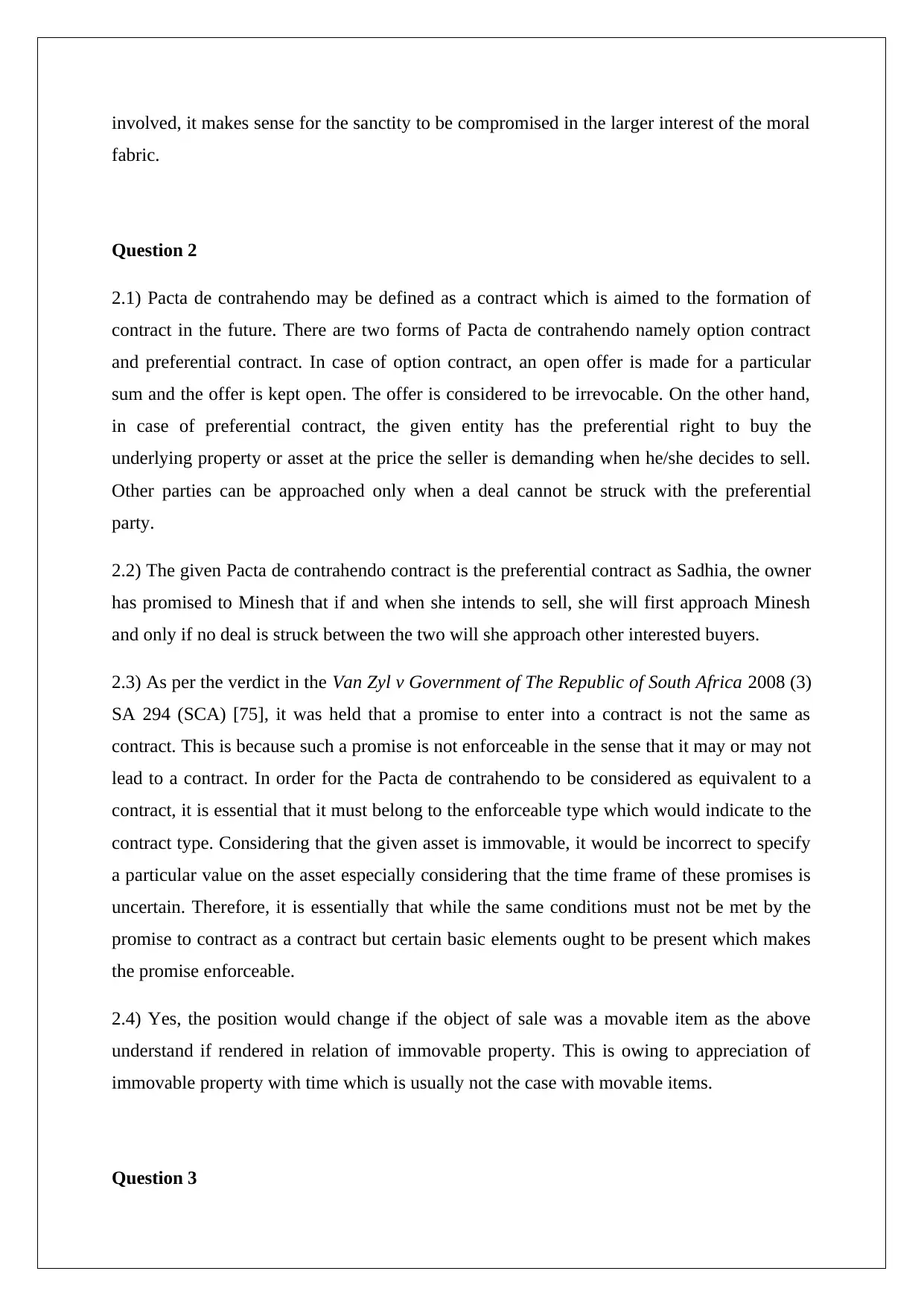
involved, it makes sense for the sanctity to be compromised in the larger interest of the moral
fabric.
Question 2
2.1) Pacta de contrahendo may be defined as a contract which is aimed to the formation of
contract in the future. There are two forms of Pacta de contrahendo namely option contract
and preferential contract. In case of option contract, an open offer is made for a particular
sum and the offer is kept open. The offer is considered to be irrevocable. On the other hand,
in case of preferential contract, the given entity has the preferential right to buy the
underlying property or asset at the price the seller is demanding when he/she decides to sell.
Other parties can be approached only when a deal cannot be struck with the preferential
party.
2.2) The given Pacta de contrahendo contract is the preferential contract as Sadhia, the owner
has promised to Minesh that if and when she intends to sell, she will first approach Minesh
and only if no deal is struck between the two will she approach other interested buyers.
2.3) As per the verdict in the Van Zyl v Government of The Republic of South Africa 2008 (3)
SA 294 (SCA) [75], it was held that a promise to enter into a contract is not the same as
contract. This is because such a promise is not enforceable in the sense that it may or may not
lead to a contract. In order for the Pacta de contrahendo to be considered as equivalent to a
contract, it is essential that it must belong to the enforceable type which would indicate to the
contract type. Considering that the given asset is immovable, it would be incorrect to specify
a particular value on the asset especially considering that the time frame of these promises is
uncertain. Therefore, it is essentially that while the same conditions must not be met by the
promise to contract as a contract but certain basic elements ought to be present which makes
the promise enforceable.
2.4) Yes, the position would change if the object of sale was a movable item as the above
understand if rendered in relation of immovable property. This is owing to appreciation of
immovable property with time which is usually not the case with movable items.
Question 3
fabric.
Question 2
2.1) Pacta de contrahendo may be defined as a contract which is aimed to the formation of
contract in the future. There are two forms of Pacta de contrahendo namely option contract
and preferential contract. In case of option contract, an open offer is made for a particular
sum and the offer is kept open. The offer is considered to be irrevocable. On the other hand,
in case of preferential contract, the given entity has the preferential right to buy the
underlying property or asset at the price the seller is demanding when he/she decides to sell.
Other parties can be approached only when a deal cannot be struck with the preferential
party.
2.2) The given Pacta de contrahendo contract is the preferential contract as Sadhia, the owner
has promised to Minesh that if and when she intends to sell, she will first approach Minesh
and only if no deal is struck between the two will she approach other interested buyers.
2.3) As per the verdict in the Van Zyl v Government of The Republic of South Africa 2008 (3)
SA 294 (SCA) [75], it was held that a promise to enter into a contract is not the same as
contract. This is because such a promise is not enforceable in the sense that it may or may not
lead to a contract. In order for the Pacta de contrahendo to be considered as equivalent to a
contract, it is essential that it must belong to the enforceable type which would indicate to the
contract type. Considering that the given asset is immovable, it would be incorrect to specify
a particular value on the asset especially considering that the time frame of these promises is
uncertain. Therefore, it is essentially that while the same conditions must not be met by the
promise to contract as a contract but certain basic elements ought to be present which makes
the promise enforceable.
2.4) Yes, the position would change if the object of sale was a movable item as the above
understand if rendered in relation of immovable property. This is owing to appreciation of
immovable property with time which is usually not the case with movable items.
Question 3
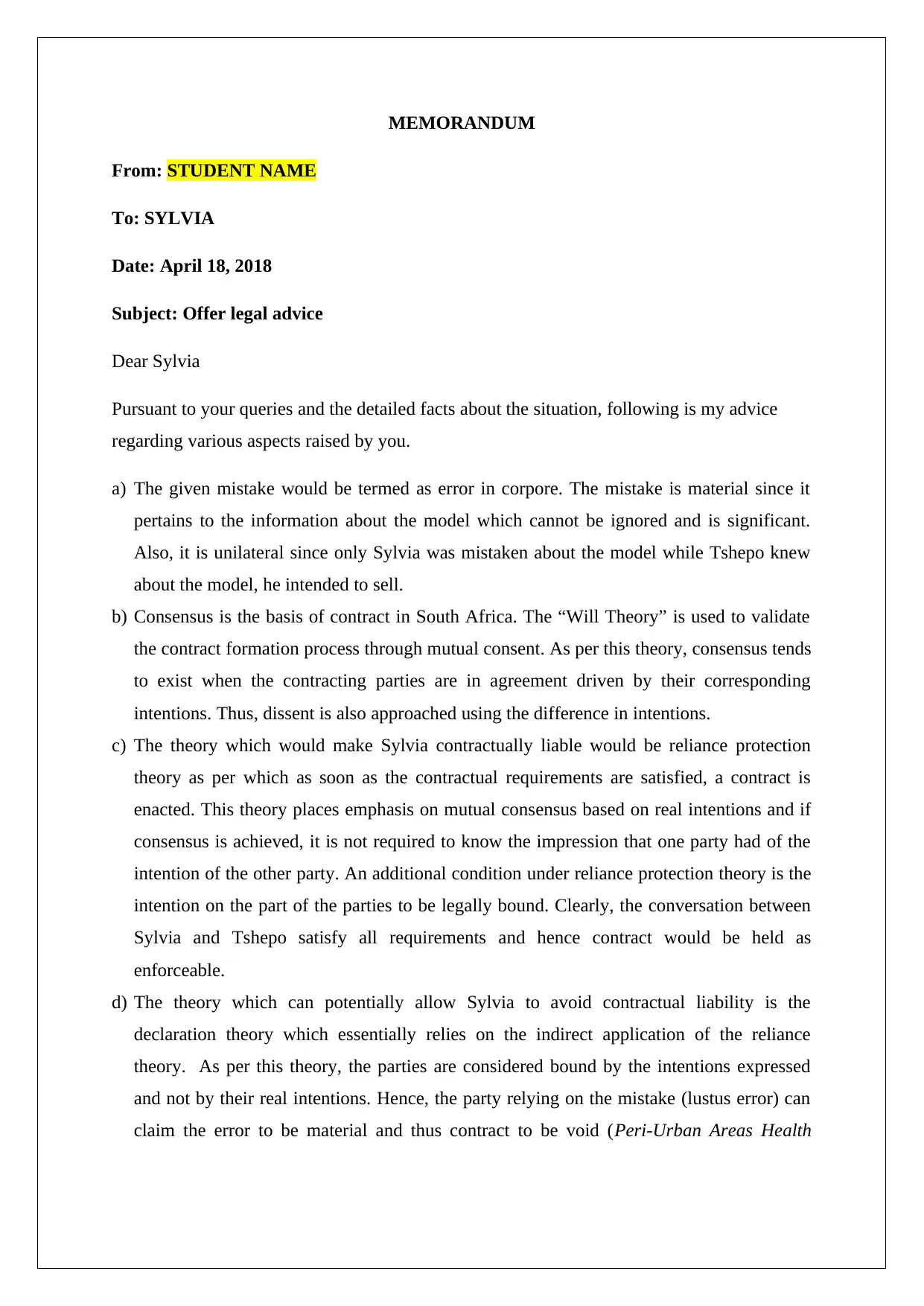
MEMORANDUM
From: STUDENT NAME
To: SYLVIA
Date: April 18, 2018
Subject: Offer legal advice
Dear Sylvia
Pursuant to your queries and the detailed facts about the situation, following is my advice
regarding various aspects raised by you.
a) The given mistake would be termed as error in corpore. The mistake is material since it
pertains to the information about the model which cannot be ignored and is significant.
Also, it is unilateral since only Sylvia was mistaken about the model while Tshepo knew
about the model, he intended to sell.
b) Consensus is the basis of contract in South Africa. The “Will Theory” is used to validate
the contract formation process through mutual consent. As per this theory, consensus tends
to exist when the contracting parties are in agreement driven by their corresponding
intentions. Thus, dissent is also approached using the difference in intentions.
c) The theory which would make Sylvia contractually liable would be reliance protection
theory as per which as soon as the contractual requirements are satisfied, a contract is
enacted. This theory places emphasis on mutual consensus based on real intentions and if
consensus is achieved, it is not required to know the impression that one party had of the
intention of the other party. An additional condition under reliance protection theory is the
intention on the part of the parties to be legally bound. Clearly, the conversation between
Sylvia and Tshepo satisfy all requirements and hence contract would be held as
enforceable.
d) The theory which can potentially allow Sylvia to avoid contractual liability is the
declaration theory which essentially relies on the indirect application of the reliance
theory. As per this theory, the parties are considered bound by the intentions expressed
and not by their real intentions. Hence, the party relying on the mistake (lustus error) can
claim the error to be material and thus contract to be void (Peri-Urban Areas Health
From: STUDENT NAME
To: SYLVIA
Date: April 18, 2018
Subject: Offer legal advice
Dear Sylvia
Pursuant to your queries and the detailed facts about the situation, following is my advice
regarding various aspects raised by you.
a) The given mistake would be termed as error in corpore. The mistake is material since it
pertains to the information about the model which cannot be ignored and is significant.
Also, it is unilateral since only Sylvia was mistaken about the model while Tshepo knew
about the model, he intended to sell.
b) Consensus is the basis of contract in South Africa. The “Will Theory” is used to validate
the contract formation process through mutual consent. As per this theory, consensus tends
to exist when the contracting parties are in agreement driven by their corresponding
intentions. Thus, dissent is also approached using the difference in intentions.
c) The theory which would make Sylvia contractually liable would be reliance protection
theory as per which as soon as the contractual requirements are satisfied, a contract is
enacted. This theory places emphasis on mutual consensus based on real intentions and if
consensus is achieved, it is not required to know the impression that one party had of the
intention of the other party. An additional condition under reliance protection theory is the
intention on the part of the parties to be legally bound. Clearly, the conversation between
Sylvia and Tshepo satisfy all requirements and hence contract would be held as
enforceable.
d) The theory which can potentially allow Sylvia to avoid contractual liability is the
declaration theory which essentially relies on the indirect application of the reliance
theory. As per this theory, the parties are considered bound by the intentions expressed
and not by their real intentions. Hence, the party relying on the mistake (lustus error) can
claim the error to be material and thus contract to be void (Peri-Urban Areas Health
Secure Best Marks with AI Grader
Need help grading? Try our AI Grader for instant feedback on your assignments.
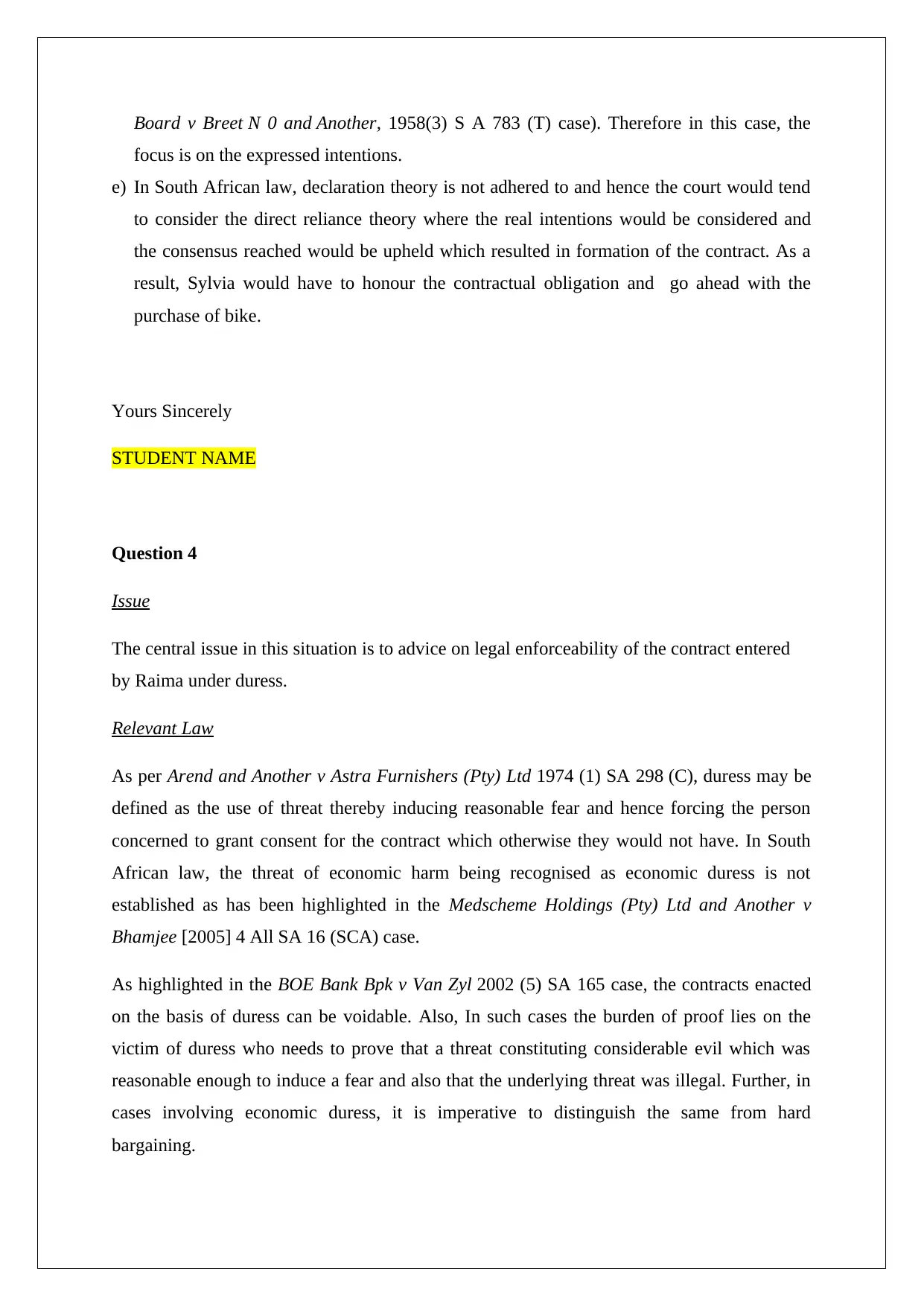
Board v Breet N 0 and Another, 1958(3) S A 783 (T) case). Therefore in this case, the
focus is on the expressed intentions.
e) In South African law, declaration theory is not adhered to and hence the court would tend
to consider the direct reliance theory where the real intentions would be considered and
the consensus reached would be upheld which resulted in formation of the contract. As a
result, Sylvia would have to honour the contractual obligation and go ahead with the
purchase of bike.
Yours Sincerely
STUDENT NAME
Question 4
Issue
The central issue in this situation is to advice on legal enforceability of the contract entered
by Raima under duress.
Relevant Law
As per Arend and Another v Astra Furnishers (Pty) Ltd 1974 (1) SA 298 (C), duress may be
defined as the use of threat thereby inducing reasonable fear and hence forcing the person
concerned to grant consent for the contract which otherwise they would not have. In South
African law, the threat of economic harm being recognised as economic duress is not
established as has been highlighted in the Medscheme Holdings (Pty) Ltd and Another v
Bhamjee [2005] 4 All SA 16 (SCA) case.
As highlighted in the BOE Bank Bpk v Van Zyl 2002 (5) SA 165 case, the contracts enacted
on the basis of duress can be voidable. Also, In such cases the burden of proof lies on the
victim of duress who needs to prove that a threat constituting considerable evil which was
reasonable enough to induce a fear and also that the underlying threat was illegal. Further, in
cases involving economic duress, it is imperative to distinguish the same from hard
bargaining.
focus is on the expressed intentions.
e) In South African law, declaration theory is not adhered to and hence the court would tend
to consider the direct reliance theory where the real intentions would be considered and
the consensus reached would be upheld which resulted in formation of the contract. As a
result, Sylvia would have to honour the contractual obligation and go ahead with the
purchase of bike.
Yours Sincerely
STUDENT NAME
Question 4
Issue
The central issue in this situation is to advice on legal enforceability of the contract entered
by Raima under duress.
Relevant Law
As per Arend and Another v Astra Furnishers (Pty) Ltd 1974 (1) SA 298 (C), duress may be
defined as the use of threat thereby inducing reasonable fear and hence forcing the person
concerned to grant consent for the contract which otherwise they would not have. In South
African law, the threat of economic harm being recognised as economic duress is not
established as has been highlighted in the Medscheme Holdings (Pty) Ltd and Another v
Bhamjee [2005] 4 All SA 16 (SCA) case.
As highlighted in the BOE Bank Bpk v Van Zyl 2002 (5) SA 165 case, the contracts enacted
on the basis of duress can be voidable. Also, In such cases the burden of proof lies on the
victim of duress who needs to prove that a threat constituting considerable evil which was
reasonable enough to induce a fear and also that the underlying threat was illegal. Further, in
cases involving economic duress, it is imperative to distinguish the same from hard
bargaining.
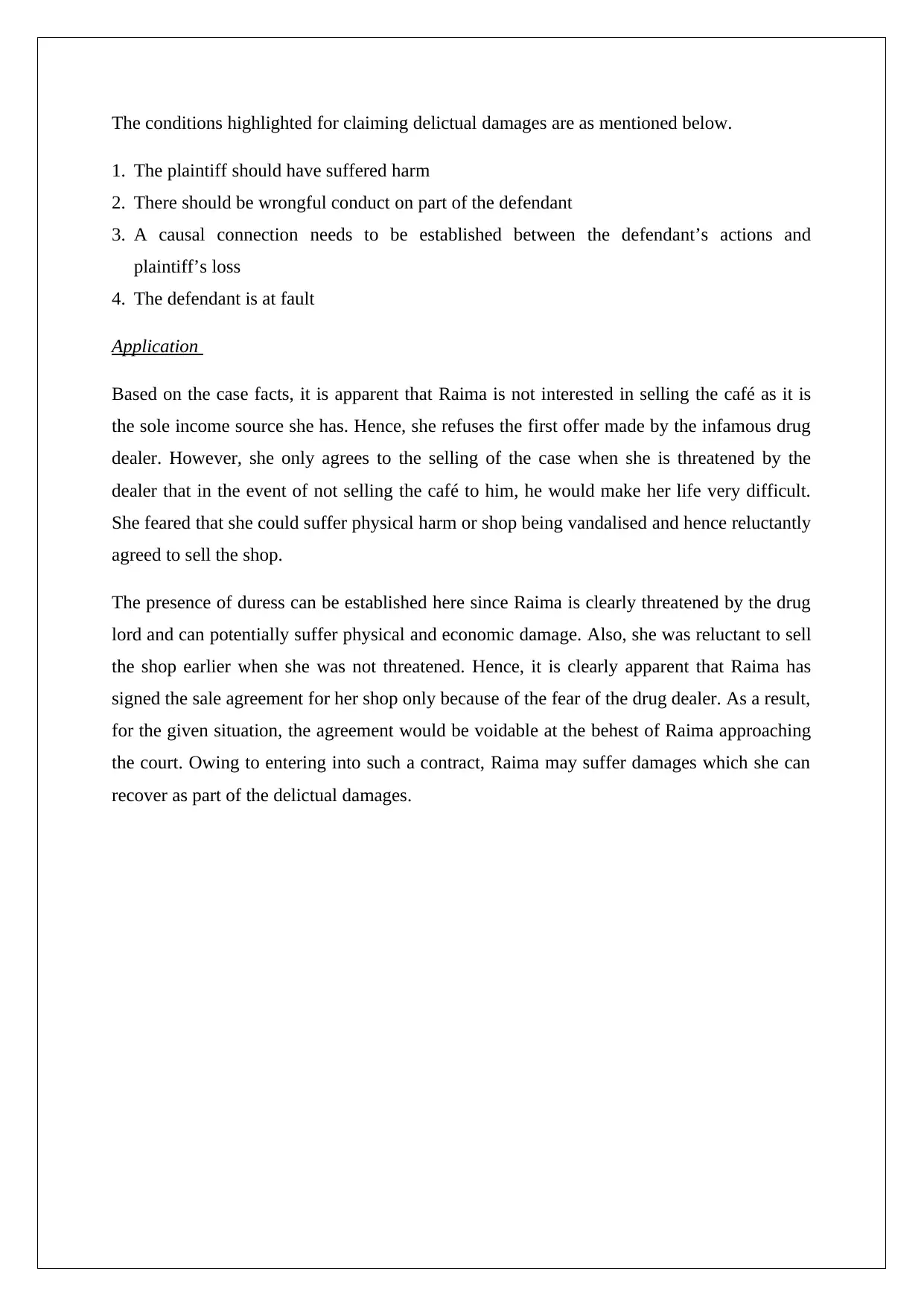
The conditions highlighted for claiming delictual damages are as mentioned below.
1. The plaintiff should have suffered harm
2. There should be wrongful conduct on part of the defendant
3. A causal connection needs to be established between the defendant’s actions and
plaintiff’s loss
4. The defendant is at fault
Application
Based on the case facts, it is apparent that Raima is not interested in selling the café as it is
the sole income source she has. Hence, she refuses the first offer made by the infamous drug
dealer. However, she only agrees to the selling of the case when she is threatened by the
dealer that in the event of not selling the café to him, he would make her life very difficult.
She feared that she could suffer physical harm or shop being vandalised and hence reluctantly
agreed to sell the shop.
The presence of duress can be established here since Raima is clearly threatened by the drug
lord and can potentially suffer physical and economic damage. Also, she was reluctant to sell
the shop earlier when she was not threatened. Hence, it is clearly apparent that Raima has
signed the sale agreement for her shop only because of the fear of the drug dealer. As a result,
for the given situation, the agreement would be voidable at the behest of Raima approaching
the court. Owing to entering into such a contract, Raima may suffer damages which she can
recover as part of the delictual damages.
1. The plaintiff should have suffered harm
2. There should be wrongful conduct on part of the defendant
3. A causal connection needs to be established between the defendant’s actions and
plaintiff’s loss
4. The defendant is at fault
Application
Based on the case facts, it is apparent that Raima is not interested in selling the café as it is
the sole income source she has. Hence, she refuses the first offer made by the infamous drug
dealer. However, she only agrees to the selling of the case when she is threatened by the
dealer that in the event of not selling the café to him, he would make her life very difficult.
She feared that she could suffer physical harm or shop being vandalised and hence reluctantly
agreed to sell the shop.
The presence of duress can be established here since Raima is clearly threatened by the drug
lord and can potentially suffer physical and economic damage. Also, she was reluctant to sell
the shop earlier when she was not threatened. Hence, it is clearly apparent that Raima has
signed the sale agreement for her shop only because of the fear of the drug dealer. As a result,
for the given situation, the agreement would be voidable at the behest of Raima approaching
the court. Owing to entering into such a contract, Raima may suffer damages which she can
recover as part of the delictual damages.
1 out of 6
Your All-in-One AI-Powered Toolkit for Academic Success.
+13062052269
info@desklib.com
Available 24*7 on WhatsApp / Email
![[object Object]](/_next/static/media/star-bottom.7253800d.svg)
Unlock your academic potential
© 2024 | Zucol Services PVT LTD | All rights reserved.

